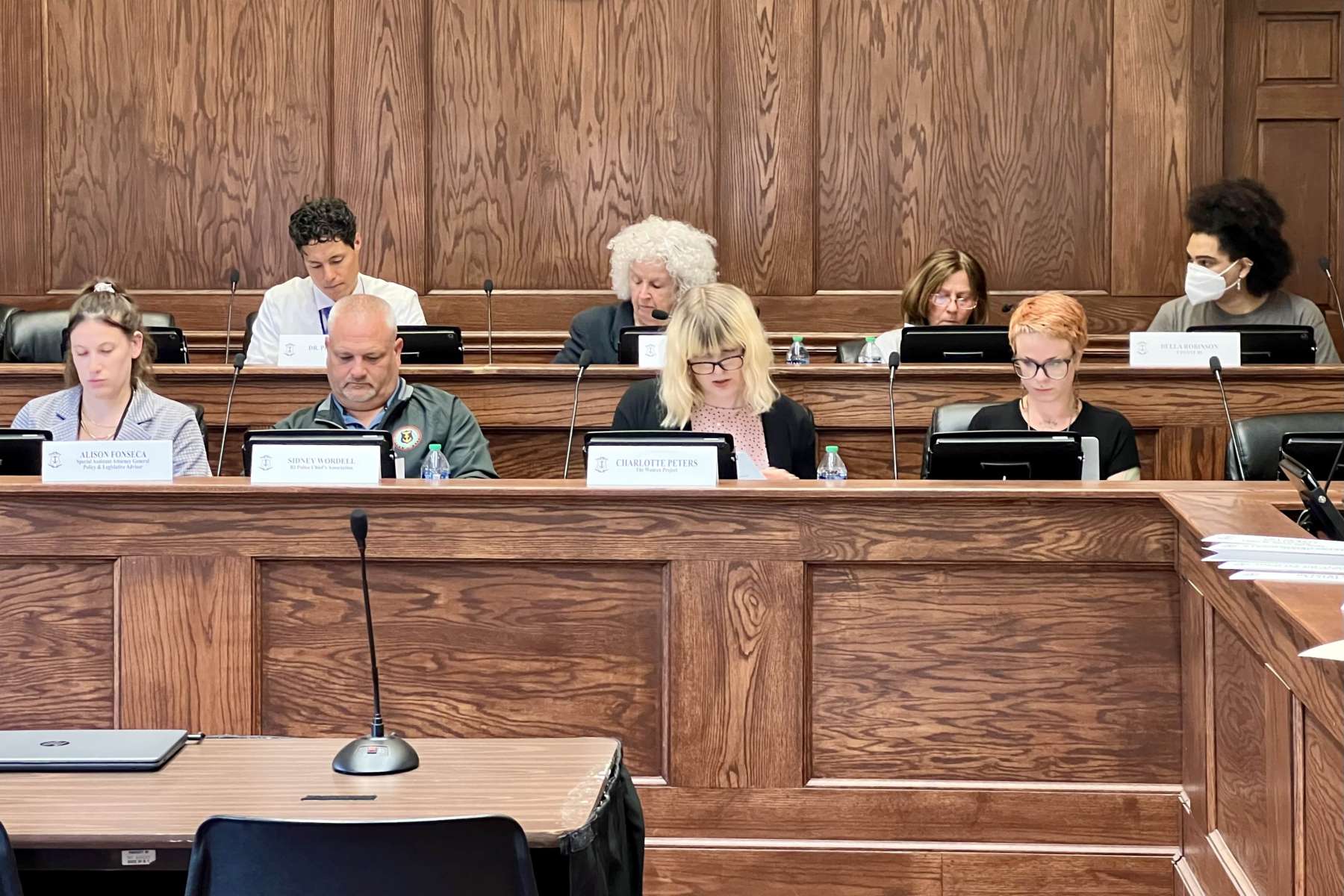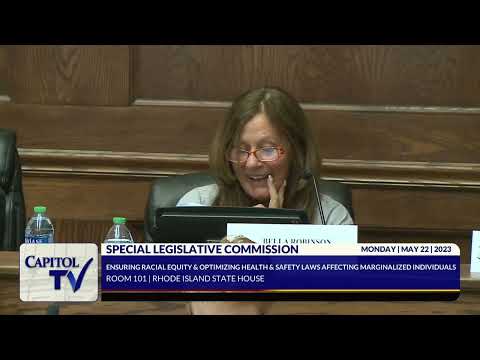RI Commission Proposes Sweeping Reforms in Laws Affecting Sex Workers
The Rhode Island House Commission on Sex Work issued a report detailing significant legislative recommendations. The goal is to challenge stigmatization and structural inequalities that disproportionately affect women, transgender individuals, and people of color.
May 23, 2023, 12:05 pm
By Steve Ahlquist
A Rhode Island House Commission on Sex Work, formally known as the Rhode Island Study Ensuring Racial Equity and Optimizing Health and Safety Laws Affecting Marginalized Individuals, concluded its work on Monday with the issuance of a thirty page report detailing a series of legislative recommendations regarding laws on prostitution and other forms of sex work.
The Commission, started by former State Representative Anastasia Williams, who lost her re-election bid last year, was concluded by Commission co-chair Representative Edith Ajello (Democrat, District 1, Providence). Many members of the Commission opined during the final meeting that they felt that there was more to do and that the Commission should continue, but Representative Ajello countered that many of the issues being raised, such as housing and poverty, were outside the purview of the Commission, and better suited to a future, as yet unspecified study commission.
That said, the original scope of the commission was very broad. The commission was formed to, “expand upon the significant research on the health and safety implications of laws related to violence, exploitation, stigma, human trafficking and sexual health, that disproportionately impact women, transgender individuals, and people of color.” The Commission was likely being wrapped up because Representative Williams was no longer at the helm, not because its work was “done.”
The Commission did not vote to approve the final report, and most members of the Commission did not see the report until just a few hours before the final meeting, but the report was approved by consensus, and delivered the following sets of recommendations:
Macro-level Recommendations
- Destigmatize Sex Work
- Address Structural Inequities based on race, class, gender, ability, education, and sexual orientation
- Ensure that all people can access needed social services
- Make sexual healthcare and informational available and accessible to all people
Legislative Recommendations
- Work towards the decriminalization of prostitution with the buy-in of critical stakeholders
- Repeal “Walking While Trans” Bans
- Immunity for Victims and Witnesses of Crime from Prosecution for Prostitution
- Address Police Sexual Violence by Ending Investigatory Sex
- Health Care Expansion and Nondiscrimination
- HIV Decriminalization and Destigmatization
- Comprehensive Criminal Record Relief
The Commission’s final report is clear that the consensus of the majority of commission members is to recommend that Rhode Island decriminalize consensual adult sex work by repealing prostitution statutes, but adds that this “is a long-term goal that is only feasible with the input of critical stakeholders and will take some time and education to achieve.”
Recommendations from various commission members were stronger than those included in the final report. For instance, Commission members and co-founders of the The Ishtar Collective, J. Leigh Oshiro-Brantly and Henri Bynx presented on the intersection of LGBTQIA individuals and sex workers’ rights on June 13 of last year and concluded with the following recommendations:
- Pass a law that grants immunity from prosecution to people engaged in commercial sexual activity if they report to law enforcement that they are victims of or witnesses to a crime.
- Fully decriminalize consensual adult sex work.
- Repeal “Loitering for Prostitution” and “Loitering for Indecent Purposes” which have become known as “Walking While Trans Bans” as law enforcement uses these statutes to profile, harass, and arrest transgender women.
- Repeal Section a. In the Human Immunodeficiency Virus (HIV) Law (§ 11-34.1-12), which stipulates that: (a) Any person convicted of a violation of any provisions of chapter 34 shall be required to be tested for Human Immunodeficiency Virus (HIV). No consent for the testing shall be required.
- Pass House Bill 5464 — patients will not be denied appropriate healthcare on the basis of their sex work history.
- Pass Senate Bill 249/ House Bill 6049 — which would create a new criminal offense of “custodial sexual assault,” which occurs when a peace officer perpetrates a sexual assault while a victim is in their custody.
COYOTE Rhode Island, a sex workers rights advocacy group, submitted stronger and more expansive recommendations that were not included in the final repor. Coyote also recommended:
- The pandering law should be removed entirely.
- Rhode Island’s state trafficking of a minor law could be brought in line with federal law by
adding a “reckless disregard” clause, it could be amended to include an exception for charging 18-19 year olds who are also engaging in sex work and not abusive, or be entirely eliminated as the federal law is sufficient and the state law is redundant. - Pass an immunity bill that includes protection for massage workers and immunity in reporting crimes against a person but not moral crimes like prostitution.
- Expand Rhode Island’s sexual assault statute to make it clear that sexual penetration or sexual contact as an investigative tactic is not okay and is criminal behavior. This can be accomplished by:
- Adding the following as (5) to § 11-37-2. First degree sexual assault and (4) to § 11-37-4. Second degree sexual assault: The accused is or claims to be a peace officer in the state of Rhode Island and investigates, detains, or arrests the victim for the purpose of sexual arousal, gratification, or stimulation.
- Adding people under investigations to the protections in, and passing S2233 & H6637.
- Rhode Island’s police departments and state police should not work with ICE officials in prostitution enforcement as ICE involvement is highly correlated with an increase in the targeting and deportation of Asian workers.
- Rhode Island police and prosecutors should be instructed to prioritize cases where force, fraud, or coercion are used against minors, and to treat their non-abusive peers respectfully as valuable potential witnesses and reporters.
- Rhode Island police and prosecutors should be instructed to consistently monitor group home staff and prioritize the investigation and prosecution of abusive group home staff or foster parents. Youth should find state care to be safer than and preferable to the sex industry.
- The Rhode Island legislature should work to understand and address the problem of youth in state care running away from group and foster homes to engage in sex work. While it does seem that several cases in Rhode Island were related to the violent pimp who was employed as a group home supervisor, several were not. This issue is common across the country and there are several innovative and even cost saving strategies being used to address these conditions, including rapid re housing, host home programs for LGBT youth, and LGBT specific youth homes. The legislature should commission a community based, participant driven research paper with recommendations to be conducted with recent Rhode Island group home graduates.
- Rhode Island sex workers and sex trafficking survivors should be at the forefront of Rhode Island’s discussions and research around prostitution and sex trafficking. Any discussion of policy regulating the sex industry must include COYOTE RI.
There is little in the final Commission report about Asian spa workers, which is a shame. The Commission had Dr. Elena Shih of Brown University as a member, and one of her areas of expertise is migrant sex work, as differentiated from human trafficking. In a report she shared with the Commission, Un-Licensed: Asian Migrant Massage Licensure and the Racialized Policing of Poverty Dr. Shih showed how “Asian massage work has become criminalized in a specific and racialized way in the last decade” and that “these targeted attacks are inextricably linked to the misplaced advocacy of the anti-trafficking movement, which often claims it is saving Asian massage workers, when it is, in actuality, subjecting them to varied forms of state and stated-sanctioned-if-privatized violence.”
Dr. Shih’s recommendation that the General Assembly reconsider Rhode Island’s 2016 Body Work ordinance was not included in the final report.
In the near term, it is unlikely that the Rhode Island General Assembly will take real action on laws regarding sex work, though there is some hope that a law preventing law enforcement officers from engaging in sexual contact as an investigatory tool will be passed next year. Enforcement of prostitution laws in Rhode Island continues to be racialized and continues to target the poor and the marginalized.
In Dr. Shih’s letter to the Commission she highlighted one consequence of bad policy:
“In December 2019, during the last such raid before the COVID-19 pandemic, the Pawtucket Police Department and Department of Homeland Security raided three Asian massage businesses in Pawtucket and arrested 19 people. Most of the Asian massage workers arrested were charged with not having a massage therapy license; only three employees were charged with prostitution. After their arrest, workers’ charges were dropped and only the business owners were indicted. All arrested workers attested that they were NOT victims of trafficking, instead asserting that they were low wage workers, of mixed immigration status, trying to earn a living. The experience of raid, arrest, and preliminary charges have a grave impact on the social, emotional, and financial well-being of migrant workers.
“A recent 2021 ruling on the case mandated that Grace Kwon, 57, the owner of the spas, forfeit about $650,000 in cash proceeds and assets. The proceeds were to be divided between the Pawtucket Police Department and the attorney general’s office in an 80-20 split. These consequences, which take money from Asian businesses and redistribute them to police and prosecutorial agencies, do nothing to support Asian massage workers.“




